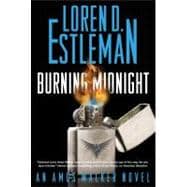
Note: Supplemental materials are not guaranteed with Rental or Used book purchases.
Purchase Benefits
What is included with this book?
Praise for Infernal Angels:
“Shamus Award–winner Estleman demonstrates that the art of inserting a Philip Marlowe–esque hero into modern times is alive and well in his twenty-first novel featuring Detroit PI Amos Walker…. Estleman presents a powerful view of the battered inner city. Three decades on, Estleman and Walker show no signs of slowing down.”—Publishers Weekly, Starred Review
“Estleman has piled up enough literary awards to add a wing to his home. Read this classic yet modern example of the hard-boiled detective novel and you’ll begin to understand why.”—Booklist
And for The Left-Handed Dollar:
“Estleman’s latest intricate and wholly enjoyable yarn is peppered with mob lore, Detroit history, and the ever-present one-liners. It’s sure to please fans of urban mysteries as well as classic detective genre devotees. Strongly recommended.”—Library Journal
“Amos Walker, the throwback private eye who operates out of Detroit in Loren D. Estleman’s hard-boiled mysteries, is a lot like the old Cutlass he drives. The guy may look beat up, but under the hood he’s a clean machine.”—The New York Times Book Review
The New copy of this book will include any supplemental materials advertised. Please check the title of the book to determine if it should include any access cards, study guides, lab manuals, CDs, etc.
The Used, Rental and eBook copies of this book are not guaranteed to include any supplemental materials. Typically, only the book itself is included. This is true even if the title states it includes any access cards, study guides, lab manuals, CDs, etc.